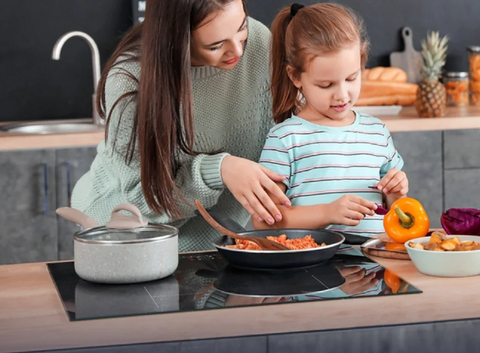Induction hobs have revolutionized the way we cook in our kitchens. Their efficiency, safety, and speed have made them popular for professional chefs and home cooks. This comprehensive guide will delve into everything you need to know about induction hobs. From understanding how they work to exploring their advantages, we've got you covered.

Induction hobs, also known as induction cooktops or induction stoves, have revolutionized how we cook in our kitchens. Their efficiency, safety, and speed have made them a popular choice for both professional chefs and home cooks. This comprehensive guide will delve into everything you need to know about induction hobs and induction cooking. From understanding how they work to exploring their advantages, we've got you covered.
Induction Hob: How Does It Work?
Understanding the science behind induction hobs is essential to fully appreciate their capabilities. Unlike conventional cookers that rely on open flames or electric coils, induction cooktops use electromagnetic fields to generate heat directly within the cookware. Here's how it works:
Magnetic Induction
Electromagnetic Coils: Beneath the ceramic surface of the induction hob, there are copper coils that generate electromagnetic fields when electricity flows through them.
Cookware Interaction: To work with an induction stove, your cookware must have a ferrous metal base. When you place a compatible pot or pan on the hob, the electromagnetic field interacts with the metal, inducing a flow of electrical current within the cookware.
Heat Generation: This induced current creates heat directly within the cookware itself, effectively turning your pots and pans into the heat source. As a result, your food heats up quickly and efficiently.
Advantages of Magnetic Induction
Rapid Heating: Induction hobs heat up faster than traditional cookers, reducing cooking times significantly.
Precise Temperature Control: You can adjust the heat with precision, allowing for better control over your cooking.
Energy Efficiency: Since the heat is generated directly within the cookware, there is minimal heat loss, making induction hobs highly energy-efficient.
Why Choose an Induction Hob?
If you're still on the fence about whether to invest in an induction hob, here are some compelling reasons why it might be the right choice for your kitchen:
- Speed and Efficiency
Induction cooktops are renowned for their rapid heating capabilities. They can boil water in a fraction of the time it takes traditional cookers, saving you valuable minutes during meal preparation.
- Safety First
Safety is a top priority in any kitchen. Induction stoves are designed with safety in mind. Since the cookware itself heats up, there are no open flames or hot coils, reducing the risk of burns or fires.
- Precision Cooking
Achieving the perfect temperature for your culinary creations is a breeze with induction hobs. You can precisely control the heat, whether you're simmering, sautéing, or searing.
- Easy Cleanup
Induction hobs have a smooth, glass-ceramic surface that is easy to clean. Spills and splatters can be wiped away effortlessly, making post-cooking cleanup a breeze.
- Energy Efficiency
Induction hobs waste very little energy since the heat is generated directly in the cookware. This means lower energy bills and a reduced carbon footprint.
Frequently Asked Questions (FAQs)
Q: Are induction hobs safe to use?
A: Yes, induction hobs are safe to use. They are equipped with safety features such as automatic shut-off when no cookware is detected, and they don't have open flames or hot surfaces.
Q: Do I need special cookware for induction cooking?
A: Yes, your cookware must have a ferrous metal base (e.g., stainless steel or cast iron) to work with induction hobs. You can check if your existing cookware is compatible by using a magnet—if it sticks to the bottom, it will work.
Q: Are induction hobs energy-efficient?
A: Yes, induction hobs are highly energy-efficient. They waste minimal heat and cook food faster, which can lead to energy savings in the long run.
Q: Do induction hobs require special installation?
A: Not necessarily. Induction hobs can be installed similarly to traditional cookers, but you may need to ensure you have the correct electrical wiring and circuitry to support them.
Q: Can I use any type of utensils with induction hobs?
A: Utensils made of ferrous metals like stainless steel and cast iron are the best choices for induction hobs. Avoid using aluminium, glass, or copper cookware.
Q: Are induction hobs noisy?
A: Induction hobs are known for their quiet operation. You may only hear a low humming from the electromagnetic coils.

